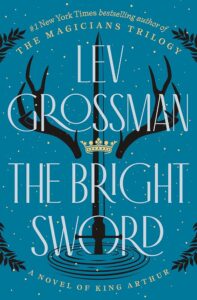 The Bright Sword. Grossman. A story of Camelot following shortly after the death of Arthur. Grossman embraces the popular and modernized side of Arthurian fiction. Characters speak in a more or less modern tone, though without going so far with cliches and phrasings as to break the suspension of disbelief. History is jumbled around as necessary or desired, but again in discrete and traditional ways. For example, Sir Palomides is one of the main characters. He’s somehow a Muslim from Baghdad… before Muhammad was born and some centuries before Baghdad was founded. Yet this ahistoricity is well in line with Arthurian fiction—Palomides is traditionally labeled a Saracen, which in the time period would roughly mean a pagan from the Middle East but later came to be synonymous with Muslim—and definitely would not have bothered classic Arthurian authors. In any event, the modern tone and lack of fuss about strict historical accuracy facilitates a quick reading adventure story. Notably for this day and age, The Bright Sword is not intended to be the start of a series or anything like that. There’s a coherent story arc that comes to a definite conclusion with the important matters all wrapped up. Major themes include the basic Arthurian conflict between paganism and Christianity; what it means to believe you are fighting for (a) God and to credit your victories to them, only to then suffer catastrophic and final defeat; the migration of peoples and evolution of cultures and lands, in this case from the Old Ones to the Picts and Celts to the Romans to the Britons to the Saxons.
The Bright Sword. Grossman. A story of Camelot following shortly after the death of Arthur. Grossman embraces the popular and modernized side of Arthurian fiction. Characters speak in a more or less modern tone, though without going so far with cliches and phrasings as to break the suspension of disbelief. History is jumbled around as necessary or desired, but again in discrete and traditional ways. For example, Sir Palomides is one of the main characters. He’s somehow a Muslim from Baghdad… before Muhammad was born and some centuries before Baghdad was founded. Yet this ahistoricity is well in line with Arthurian fiction—Palomides is traditionally labeled a Saracen, which in the time period would roughly mean a pagan from the Middle East but later came to be synonymous with Muslim—and definitely would not have bothered classic Arthurian authors. In any event, the modern tone and lack of fuss about strict historical accuracy facilitates a quick reading adventure story. Notably for this day and age, The Bright Sword is not intended to be the start of a series or anything like that. There’s a coherent story arc that comes to a definite conclusion with the important matters all wrapped up. Major themes include the basic Arthurian conflict between paganism and Christianity; what it means to believe you are fighting for (a) God and to credit your victories to them, only to then suffer catastrophic and final defeat; the migration of peoples and evolution of cultures and lands, in this case from the Old Ones to the Picts and Celts to the Romans to the Britons to the Saxons.